PHQ-9 Printable: Quick Patient Health Questionnaire Screening
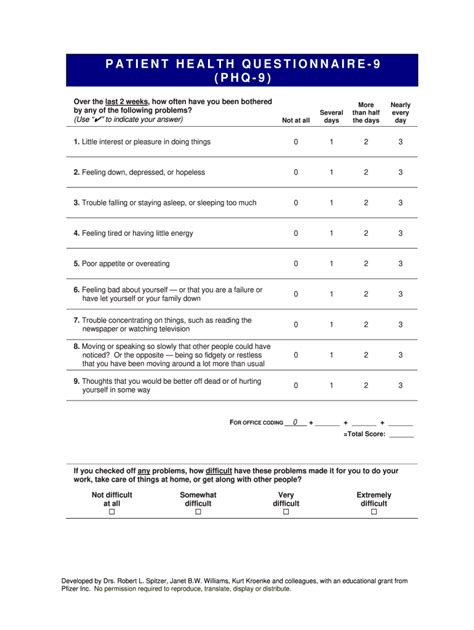
Patient Health Questionnaire (PHQ-9) Screening: A Comprehensive Guide
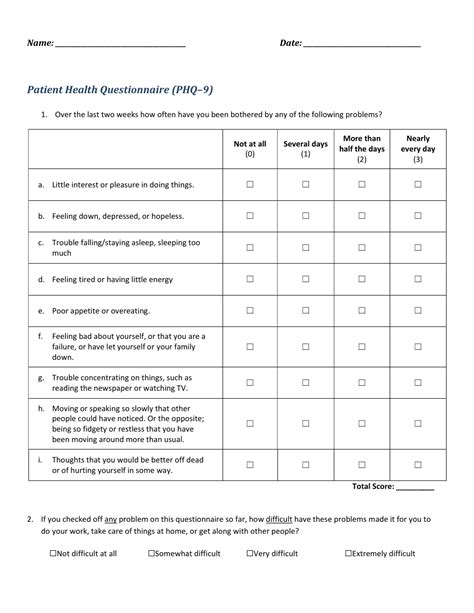
The Patient Health Questionnaire (PHQ-9) is a widely used, evidence-based screening tool for assessing depression in primary care settings. It’s a simple, 9-question survey that helps healthcare providers identify patients who may be experiencing depressive symptoms. In this article, we’ll delve into the world of PHQ-9, exploring its history, benefits, and how to use it effectively.
What is the PHQ-9?
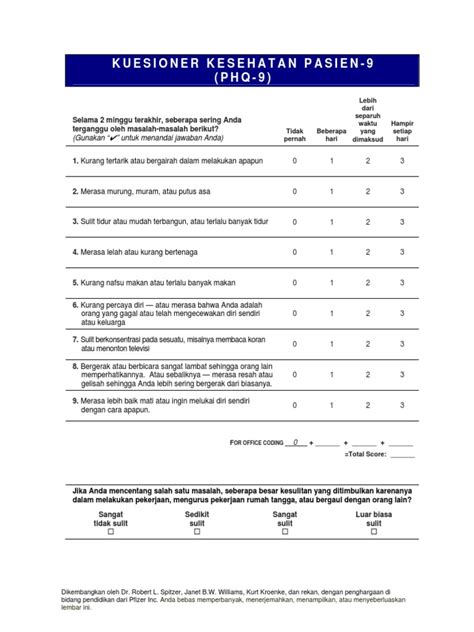
The PHQ-9 is a standardized, self-administered questionnaire that assesses the frequency and severity of depressive symptoms. Developed by Dr. Robert L. Spitzer and his colleagues in the late 1990s, the PHQ-9 is based on the diagnostic criteria for major depressive disorder (MDD) outlined in the Diagnostic and Statistical Manual of Mental Disorders, Fourth Edition (DSM-IV).
Benefits of Using the PHQ-9
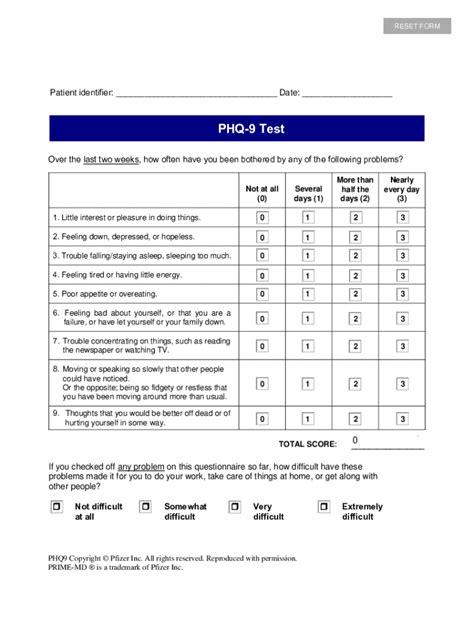
The PHQ-9 offers several benefits, including:
- Convenience: The PHQ-9 is a quick and easy-to-administer screening tool, taking only a few minutes to complete.
- Sensitivity and specificity: The PHQ-9 has been shown to be highly sensitive (85%) and specific (95%) in detecting major depressive disorder.
- Standardization: The PHQ-9 provides a standardized assessment of depressive symptoms, allowing for consistent and comparable results across different healthcare settings.
- Improved diagnosis and treatment: The PHQ-9 helps healthcare providers identify patients who may be at risk for depression, facilitating early intervention and treatment.
How to Use the PHQ-9
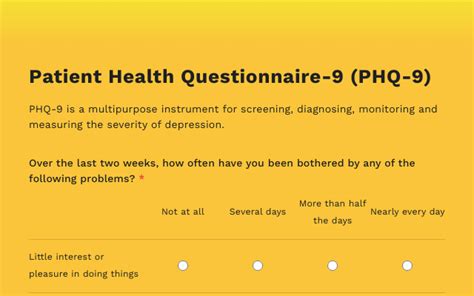
Using the PHQ-9 is straightforward:
- Administer the questionnaire: Provide the patient with the PHQ-9 questionnaire and ask them to complete it.
- Score the questionnaire: Add up the patient’s responses to each question, using the following scoring system:
- 0 points: Not at all
- 1 point: Several days
- 2 points: More than half the days
- 3 points: Nearly every day
- Interpret the results: Based on the total score, categorize the patient’s depressive symptoms as:
- Minimal (0-4 points)
- Mild (5-9 points)
- Moderate (10-14 points)
- Moderately severe (15-19 points)
- Severe (20-27 points)
PHQ-9 Printable: Download and Use
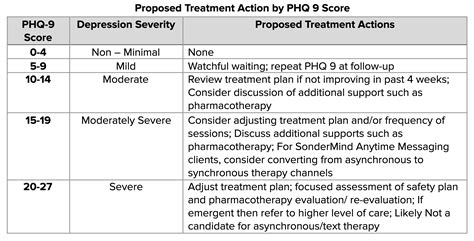
You can download the PHQ-9 questionnaire in a printable format [insert link]. This allows you to easily administer the screening tool in your healthcare setting.
Example PHQ-9 Questionnaire
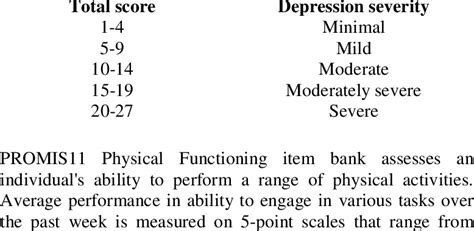
Here’s an example of what the PHQ-9 questionnaire looks like:
| Question | Not at all | Several days | More than half the days | Nearly every day |
|---|---|---|---|---|
| 1. Over the past two weeks, how often have you been bothered by feeling little interest or pleasure in doing things? | 0 | 1 | 2 | 3 |
| 2. Over the past two weeks, how often have you been bothered by feeling down, depressed, or hopeless? | 0 | 1 | 2 | 3 |
| 3. Over the past two weeks, how often have you been bothered by trouble falling or staying asleep, or sleeping too much? | 0 | 1 | 2 | 3 |
| 4. Over the past two weeks, how often have you been bothered by poor appetite or overeating? | 0 | 1 | 2 | 3 |
| 5. Over the past two weeks, how often have you been bothered by feeling tired or having little energy? | 0 | 1 | 2 | 3 |
| 6. Over the past two weeks, how often have you been bothered by feeling bad about yourself - or that you are a failure, or have let yourself or your family down? | 0 | 1 | 2 | 3 |
| 7. Over the past two weeks, how often have you been bothered by trouble concentrating on things, such as reading the newspaper or watching television? | 0 | 1 | 2 | 3 |
| 8. Over the past two weeks, how often have you been bothered by moving or speaking so slowly that other people could have noticed? Or the opposite - being so fidgety or restless that you have been moving around a lot more than usual? | 0 | 1 | 2 | 3 |
| 9. Over the past two weeks, how often have you been bothered by having thoughts that you would be better off dead, or of hurting yourself in some way? | 0 | 1 | 2 | 3 |
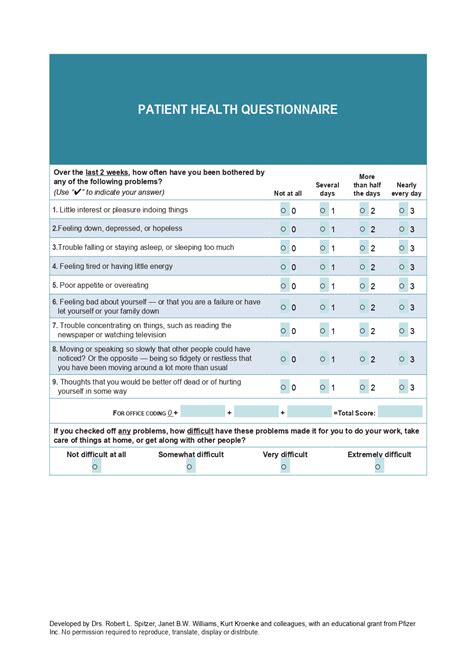
💡 Note: If a patient scores 10 or higher, consider further evaluation and potential referral to a mental health specialist.
Limitations and Considerations
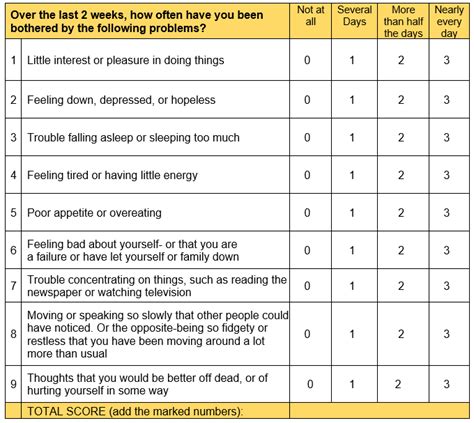
While the PHQ-9 is a valuable tool, it’s essential to recognize its limitations:
- Not a diagnostic tool: The PHQ-9 is a screening tool, not a diagnostic tool. A comprehensive diagnostic evaluation is necessary to confirm a diagnosis of depression.
- Cultural and language barriers: The PHQ-9 may not be suitable for patients with limited English proficiency or cultural backgrounds that may affect their understanding of the questions.
- Comorbid conditions: The PHQ-9 may not account for comorbid conditions that may impact depressive symptoms.
In conclusion, the PHQ-9 is a valuable tool for screening patients for depressive symptoms. By understanding its benefits, limitations, and how to use it effectively, healthcare providers can improve diagnosis and treatment outcomes for patients with depression.
What is the PHQ-9 used for?
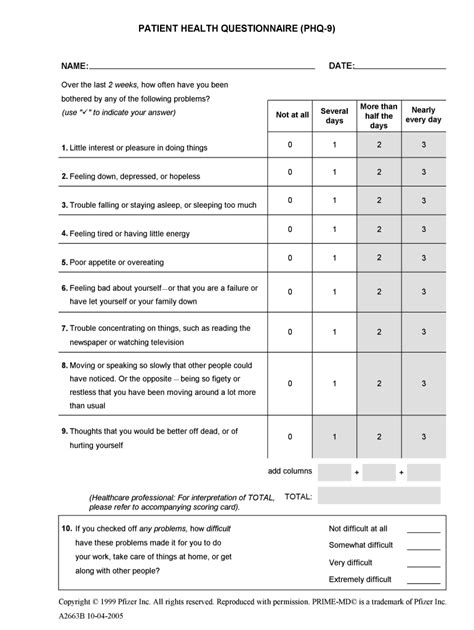
+
The PHQ-9 is a screening tool used to assess depressive symptoms in patients.
How long does it take to complete the PHQ-9?
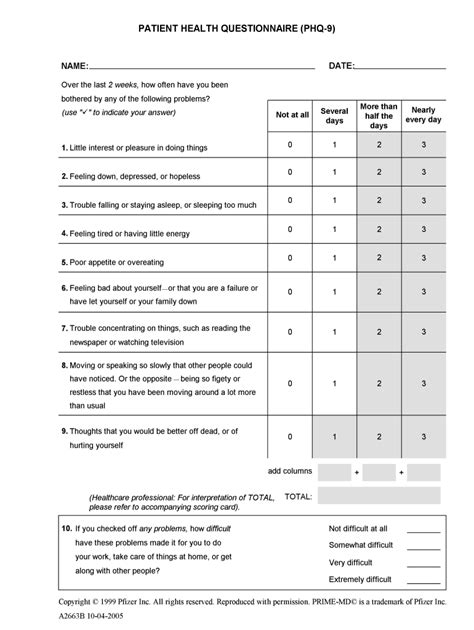
+
The PHQ-9 typically takes a few minutes to complete.
Can the PHQ-9 be used as a diagnostic tool?
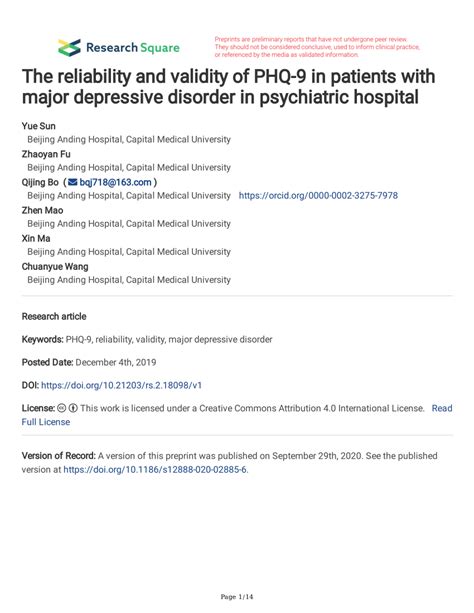
+
No, the PHQ-9 is a screening tool, not a diagnostic tool. A comprehensive diagnostic evaluation is necessary to confirm a diagnosis of depression.
Related Terms:
- phq 9 indonesia pdf
- phq 9 bahasa indonesia
- phq 9 test online
- patient health questionnaire 9 indonesia
- phq 9 pdf scoring
- phq 9 scoring interpretation



